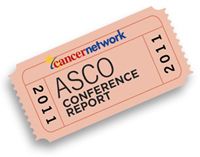Coverage from the American Society of Clinical Oncology 2011
CancerNetwork and the journal ONCOLOGY present exclusive hematology coverage from the annual meeting of the American Society of Clinical Oncology (ASCO). Follow the stories below and check back for more write-ups of the most important information to come out of this year's event.

CancerNetwork and the journal ONCOLOGY present exclusive hematology coverage from the annual meeting of the American Society of Clinical Oncology (ASCO). Follow the stories below and check back for more write-ups of the most important information to come out of this year's event.
Check back here for news and updates on hematology coverage from ASCO's Annual Meeting in Chicago.
As part of our preconference coverage,ONCOLOGY spoke with Dr. Susan O’Brien, professor in the department of leukemia at the MD Anderson Cancer Center. Dr. O’Brien was one of the presenters at the ASCO session on therapies for chronic lymphocytic leukemia, and she gave us a preview of some of the highlights of the session, as well as some insights into her own work.

Susan O'Brien, MD
ONCOLOGY: Dr. O’Brien, let me start by asking what, in your opinion, are the areas of CLL therapy in which there are the most exciting new developments?
DR. O’BRIEN: Well, there are a couple of new molecules that are very exciting, and in keeping with the theme in oncology in general of targeted therapy, these are molecules that target enzymes that are present in the B-cell receptor pathway. The relevance of this of course is that CLL is a B-cell lymphocytic disease, and activation of B-cells in general and activation of B-CLL cells provides a very strong survival stimulus to those cells. So if you could block downstream one you get activation of the B-cell receptor so that the messages that normally would be carried to the nucleus are blocked, then potentially you could interfere with these pro-survival signals and get death of the cell. And there are two drugs targeting completely different proteins but having remarkably similar mechanisms of action and efficacy that are going to be talked about at ASCO.
Click here to read more and listen to a podcast of this interview . . .